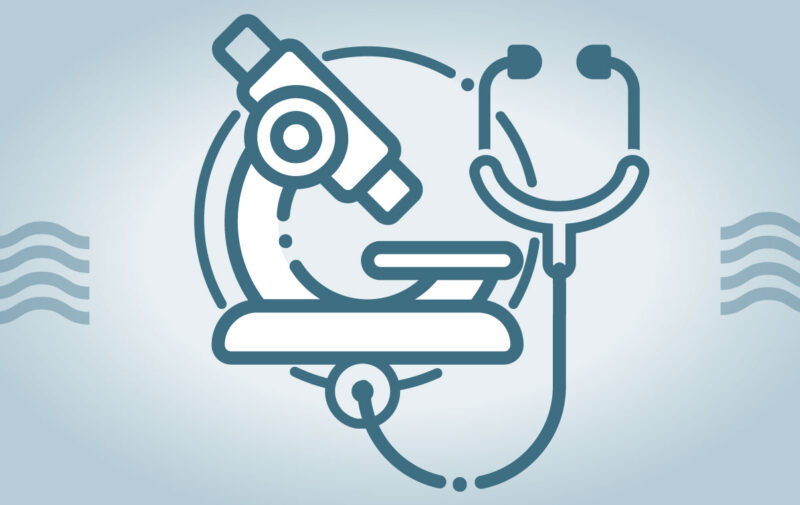
Collaborative Health Sciences Program
Testing Effectiveness of a Community Resource Navigation Intervention to Enhance Health Professional Education, Reduce Unmet Social Needs, and Improve Patient Health
Year Awarded:
2018
Patients with unmet social needs —such as housing and food insecurity —need to be paired with available community resources. At two UW Health clinics since 2016, student navigators havehelped connect patients with resources. This study will determine whether student navigators’ training and experience enhances their inter-professional development.

New Investigator Program
Kinetochore Integrity and Cancer
Year Awarded:
2018
Studies have implicated the failure of proper chromosome segregation, a process that is critical for cell proliferation and for maintaining life in all organisms, in both cancer and birth defects. This project explored the scientific premise that the kinetochore, a protein structure that forms during cell division, ensures proper chromosome segregation and prevents errors in mitosis.
This project provided fundamental insights into cancer and developmental diseases by yielding new understanding of kinetochore functions. Through the work completed during this grant period, the researchers were able to make progress on developing a novel super-resolution imaging methodology which is not only well-suited to studying kinetochore dysfunction, but also can be utilized for broad research fields.

New Investigator Program
Investigating Retention in Care to Address Healthcare Disparities in Lupus: A Wisconsin Lupus Cohort
Year Awarded:
2016
Lupus — an autoimmune disease that causes inflammation and organ damage — disproportionately affects patients of color and those of low socioeconomic status, who also experience higher rates of associated kidney disease and early death. Ensuring that patients get regular care could help keep symptoms in check, but retention predictors in lupus care are poorly understood.
This study defined retention in care for different demographic groups in Wisconsin, finding that those from the most disadvantaged neighborhoods were the most at-risk of ~60% lower retention in care. The insights generated from this research have the potential to help providers reduce lupus outcome disparities in the future.

New Investigator Program
Defining Host-Microbiome Interactions in Diabetic Wound Healing
Year Awarded:
2018
In Wisconsin, 750,000 people live with diabetes, and 25 percent of those individuals will develop a diabetic foot ulcer (DFU), a common complication of diabetes, in their lifetime. DFUs can remain open for a long time, and it can be difficult to predict which of these wounds will respond to treatment and heal or require amputation. Wound tissue supports the colonization of a diverse community of microbes referred to as a microbiome. The microbiome in the wound tissue is thought to sustain inflammation which impairs healing and tissue repair. There is a critical, unmet need to develop methods that predict if diabetic wounds will heal in response to treatment, or if they will remain open and healing will be stalled due to a complex microbiome. In this study, researchers hypothesized that the wound microbiome interacts with host healing pathways and genes that control tissue repair. Ultimately, they found that anaerobic bacteria species, which can survive and grow with no oxygen, are more abundant and transcriptionally active in the microbiome of persistent and amputated wounds. Therefore, anaerobic bacteria may serve as a predictive biomarker of wound healing.
The research team has received a $26,000 Wisconsin Alumni Research Foundation (WARF) Technology Accelerator Grant and a $2 million NIH grant to expand their work.

Collaborative Health Sciences Program
Winning the War on Antibiotic Resistance in Wisconsin: The WARRIOR Study
Year Awarded:
2015
Antibiotic resistance makes drugs less effective at treating infections, which can be very dangerous. This study explored the role that dietary fiber intake and the diversity of microorganisms in the gut may play in reducing the risk of colonization by multidrug resistant organisms (MDROs).
The study found higher rates of MDRO colonization in older, low-income, and urban-living individuals and that increased dietary fiber intake may be associated with slightly lower rates of MDRO gut colonization. Further study using leveraged grant funding in underway.

Collaborative Health Sciences Program
Genetic Susceptibility to Infection in Wisconsin Hmong
Year Awarded:
2015
In Wisconsin, people of Hmong ancestry are infected by a particular fungal lung disease at rates up to 100 times higher than people of European ancestry, a concerning public health disparity.
The researchers identified the genetic basis for susceptibility to the fungal infection in people of Hmong ancestry, providing new opportunities for treatment and education.

COVID-19 Response Grant
Genetic Surveillance of SARS-CoV-2 Spread in Wisconsin to Inform Outbreak Control
Year Awarded:
2020
This project aimed to genetically characterize SARS-CoV-2 in Wisconsin to estimate infection parameters and evaluate the effectiveness of interventions. In March 2020, little was known regarding the true extent of SARS-CoV-2 transmission in Wisconsin. Researchers used genomic surveillance, tracking of different SARS-CoV-2 strains through space and time, to inform decisions on public health measures and aid the transition between mitigation and containment strategies. Preparing the genetic epidemiology infrastructure was crucial for tracking the local SARS-CoV-2 epidemic through 2020.
The project was successful in understanding and tracking SARS-CoV-2 transmission in Wisconsin. The team utilized genomic surveillance to identify patterns in SARS-CoV-2 transmission and sequenced over 5,000 viral genomes. The establishment of a sequencing program played a vital role during the emergence of the Delta variant, contributing to its early detection in Wisconsin. This project was also one of the first to show that vaccinated people who became infected with Delta variants could transmit the virus to others. Results from this project established a vigorous new research program that attracted significant extramural support, including three new CDC-funded projects using SARS-CoV-2 genome sequences to reveal patterns in virus transmission and evolution.

COVID-19 Response Grant
Genetic epidemiology of SARS-CoV-2 in hospitals and care facilities
Year Awarded:
2020
SARS-CoV-2, the virus that causes COVID-19, genetically changes across populations at a predictable rate of one mutation approximately every 15 days. Understanding the transmission of COVID-19 in healthcare facilities, which are at the core of the pandemic in Wisconsin, is crucial to help resolve the directionality and source of infection.
In order to understand if healthcare workers are becoming infected through patient contact, the research team used information such as viral lineage and consensus sequence provided by Oxford Nanopore Technology. The researchers had an initial goal of sequencing ten transmission clusters per month from UW Hospitals and Clinics. They far surpassed this goal and have investigated 55 transmission clusters involving over 400 individuals. After identifying likely and unlikely sources of infection in healthcare workers (HCW) and comparing patient sequences to local outbreaks, they found little evidence for widespread transmission, suggesting that HCWs are most likely to become infected with SARS-CoV-2 in the community.

New Investigator Program
Community-Based Continence Promotion: Mind over Matter; Healthy Bowels, Healthy Bladder
Year Awarded:
2016
Most older women in Wisconsin experience incontinence, which impacts quality of life, but they may not seek care due to stigma. The “Mind over Matter: Healthy Bowels, Healthy Bladder (MOM)” workshop teaches women skills to improve symptoms without a medical professional.
Participants in the MOM workshop reported significant improvement in both bladder and bowel symptoms. Since the trial, more than a dozen additional MOM workshops have taken place and more widespread workshops and trainings are planned for 2020, in partnership with the Wisconsin Institute for Healthy Aging (www.wihealthyaging.org).

COVID-19 Response Grant
Leveraging Social Networks and Trusted Community Influencers to disseminate an accurate and up-to-date understanding of COVID-19 in Black, Latinx and American Indian Communities
Year Awarded:
2020
The overarching goal of this project was to disseminate accurate and up-to-date information on COVID-19 to Black, Latinx and Native American communities in Wisconsin through trusted community influencers. The project team, including a media specialist and community influencers, created and shared over 400 accurate and accessible posts with the Black, Latinx, and Native American communities in Wisconsin. Additionally, social media connections were made with 14 additional community networks between the three target communities.